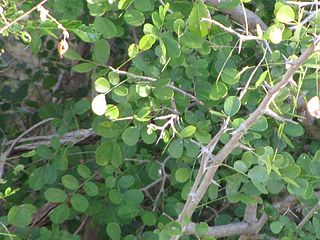
Dalbergia melanoxylon is a flowering plant in the family Fabaceae, native to seasonally dry regions of Africa from Senegal east to Eritrea and south to the north-eastern parts of South Africa. The tree is an important timber species in its native areas; it is used in the manufacture of musical instruments and fine furniture. Populations and genomic resources for genetic biodiversity maintenance in parts of its native range are threatened by overharvesting due to poor or absent conservation planning and by the species' low germination rates.
Dalbergia baronii is a species of flowering plant in the legume family Fabaceae. It is endemic to Madagascar. It is named after the English missionary and botanist Rev. Richard Baron.
Dalbergia chlorocarpa is a species of legume in the family Fabaceae. It is found only in Madagascar. It is threatened by habitat loss.
Dalbergia emirnensis is a species of legume in the family Fabaceae. It is found only in Madagascar. It is threatened by habitat loss.
Dalbergia glaucocarpa is a species of legume in the family Fabaceae. It is found only in Madagascar. It is threatened by habitat loss.
Dalbergia greveana is a species of legume in the family Fabaceae.
Dalbergia hildebrandtii is a species of legume in the family Fabaceae. It is found only in Madagascar. It is threatened by habitat loss.
Dalbergia humbertii is a species of legume in the family Fabaceae. It is found only in Madagascar.
Dalbergia lemurica is a species of legume in the family Fabaceae. It is found only in Madagascar. It is threatened by habitat loss.
Dalbergia madagascariensis is a species of legume in the family Fabaceae. It is found only in Madagascar. It is threatened by habitat loss.
Dalbergia maritima is a species of legume in the family Fabaceae; it is a rosewood, and its wood is often referred to as Bois de Rose. It is found only in Madagascar. It is threatened by habitat loss due to the over-consumption of its species.
Dalbergia monticola is a species of flowering plant in the legume family Fabaceae. It is endemic to Madagascar. It occurs at higher elevation, which gave the species its name.
Dalbergia neoperrieri is a species of legume in the family Fabaceae. It is found only in Madagascar. It is threatened by habitat loss.
Dalbergia pseudobaronii is a species of flowering plant in the legume family Fabaceae. It is endemic to Madagascar. Its leaves are similar to those of Dalbergia baronii, which gave the species its name.

Dalbergia purpurascens is a species of legume in the family Fabaceae.
Dalbergia suaresensis is a species of legume in the family Fabaceae, and is unique because it is only found in Madagascar. The plant's conservation status is listed as "endangered", and its continued existence on this planet is threatened by habitat loss.
Dalbergia tricolor is a species of legume in the family Fabaceae. It is found only in Madagascar. It is threatened by habitat loss.
Dalbergia urschii is a species of legume in the family Fabaceae. It is found only in Madagascar.
Dalbergia viguieri is a species of legume in the family Fabaceae. It is found only in Madagascar. It is threatened by habitat loss.
Dalbergia occulta is a species of flowering plant in the legume family Fabaceae. It is endemic to Madagascar. Its original description was based on a single collection, which explains its botanical name.


